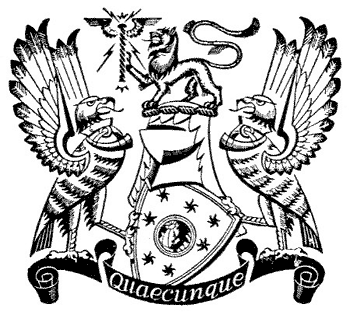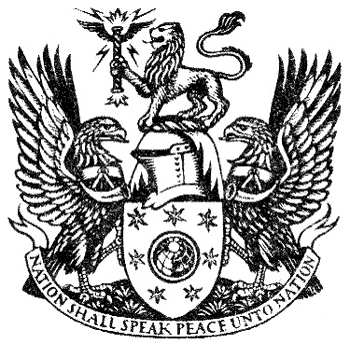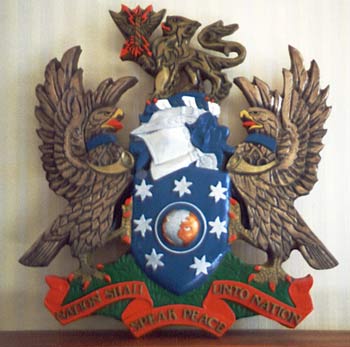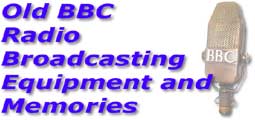Copy of memo dated 23rd October 1933:
We have several enquiries as to the origin of the motto on the coat of arms 'Nation shall speak peace unto nation'. Could you please confirm that this is not a quotation, but was contrived for us by the College of Arms, probably inspired by the following verse from the Book of Micah, Chapter 4, verse 3:
'Nation shall not lift up sword against nation,(The question has been raised by Miss Milnes of the Library)
neither shall they learn war any more.'

Copy of memo to Librarian dated 23rd October l933:
DIA has seen the above and tells me that the motto was suggested by us, and he thinks it was Mr. Stobart's idea. As you probably know, the motto is not an integral part of the coat-of-arms, and can be changed or left out, as we wish. (see footnote)
The crest and motto looked like this, right, in 1932.

The motto was changed for reasons unknown in 1934 to 'Quaecunque' meaning 'Whatsoever.' The unknown researcher says this 'Probably refers to St. Paul's Epistle to the Philippians, Chap. 4, v.8. "Whatsoever things are honest..."'
Left is how it appeared in 1942 in the Engineering Division Training Manual.

The researcher notes that fourteen years later 'It was decided by DG and the Board of Management to have the old motto "Nation Shall Speak Peace Unto Nation" on the Christmas Card in 1948. This motto is now appearing on other BBC publications although no official promulgation has been made concerning its use. (Checked with DG's Office, August 1949.)'
Right is how the crest appeared in 1969.
It is surprising how much the style has changed over the years and but for the scraps of paper in that book, I would probably have never noticed the changes.
The suggestion that the motto "Nation Shall Speak Peace Unto Nation"
was the idea of Mr. Stobart contradicts the usual attribution to Dr. Montague
Rendall. See, for example, the Oxford Dictionary of Quotations.
J. C. Stobart joined the BBC in the summer of 1924 as its first Director
of Education. A couple of years later he advocated a "wireless university",
an idea which was realised more than forty years later with the foundation
of the Open University.
Rendall was one of the founding Governors of the BBC and formerly the Headmaster
of Winchester. According to Reith he was responsible for the composition
of the inscription in the entrance hall of Broadcasting House.
Engineering staff sometimes used their own version of the motto: "Nation
shall peak six unto nation"!
The version of the crest shown in the first illustration appears in the 1930 BBC Year Book with the following note:
The successful translation of the BBC's technical and artistic functions into heraldic language almost justifies the plea that "there is nothing new under the sun." Ancient symbols have been found for the electrical nature of broadcasting (the thunderbolt and lightning flash), the speed of it (eagles), its work of public proclamation (bugles), its scope and breadth (the world and universe), and its ultimate ideal (the motto).
The heraldic description of the Coat of Arms is as follows: "Azure a Terrestrial Globe proper encircled by an Amulet Or, and seven Estoiles in Orle Argent, and for the Crest, on a Wreath of the Colours, a Lion passant Or, grasping in the dexter fore-paw a Thunderbolt proper. Supporters on either side, an Eagle, wings addorsed proper collared Azure pendent therefrom a Bugle horn stringed Or."

The colour version of the coat of arms, right, was designed and manufactured (in high relief) by Bill Wetterstad for BBC North East at the time of the opening of the then new studios in Barrack Road, Newcastle in 1988. It was unveiled by HRH Prince Charles.


